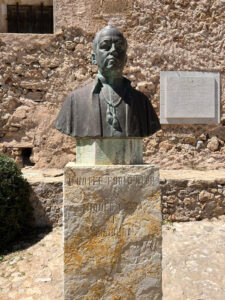THE HORACE OF MALLORCA: A SHORT BIOGRAPHY OF A REAL CLASSICIST
Miquel Costa i Llobera (10 March 1854 – 16 October 1922) was a Majorcan poet. He is widely considered as a key figure of Catalan poetry.
Born in the Majorcan town of Pollensa, Spain, in 1854, he was the son of a family of landowners with several holdings in the municipality of Pollensa, such as the ones currently occupied by Hotel Formentor or La Fortaleza. He was greatly influenced during his upbringing by his uncle, Dr. Miquel Llobera, who instilled in him a passion for classical literature.
Initially, Costa i Llobera pursued law studies in Barcelona, and was also introduced to the Catalan Renaissance movement through a common acquaintance from Majorca. Not particularly inclined towards the study of law, he made a conscious decision to chart his own unique literary journey, breaking away from the conventionalities of the Catalan Renaissance. By skillfully blending elements of both Romanticism and Classicism, he crafted a distinct and compelling poetic style that distinguished him from his contemporaries.
Some Spanish scholars such as Antoni Rubió i Lluch, assured that he was a romantic of the classicism and a classic of the romanticism. Others, such as the eminent critic Marcelino Menéndez Pelayo, considered him to be “one of the few great poets” who were alive in Spain at that time.
Miquel Costa i Llobera devoted himself to the reading and translation of the classics, among others, the poets Horace and Virgil. Initially, he chose to cultivate romantic poetry. An example of such romantic influence is his most famous ode, The Pine of Formentor. The poem, written in Catalan and published in 1885, served as a poetic homage to a beloved pine tree in Formentor, subsequently inspiring writers and painters, such as Joan Miró and Anglada Camarasa. It serves also as an ascetic metaphor of our human condition and the struggle for life, instilling in us the virtues of consistency and resilience embodied in the pine trees.
Between 1900 and 1901 he composed his long, epic poem titled La deixa del geni grec (“The Legacy of Greek Genius”). The tale recounts the story of sailors from Ancient Greece who are captured by the native Balearic slinger tribes of the island. It is also renowned for featuring one of Costa i Llobera’s most enduring creations, the legendary sibyl Nuredduna. This poem was later adapted into an opera, titled Nuredduna (1947).
Years later, in 1906, he published his most important collection of poems: Poems in the manner of Horace (“Horacianes”), which attracted the attention of a myriad of Catalan artists, including his personal friend Antoni Gaudí. Indeed, with a very careful language, Costa i Llobera employed classical poetic meters and patterns, and brought them into the Catalan language. The book was made of a total of sixteen poems or odes, which attempted to reproduce the classic stanzas of Ancient Greek and Roman poetry (Sapphics, Alcaics, and so on). The book was splendidly received in Catalonia, whilst Spanish critics like Marcelino Menéndez Pelayo and Juan Valera praised the poet’s metric innovations and quality. Frédéric Mistral, who had received the 1904 Nobel Prize in Literature, sent his compliments to the Majorcan poet in a letter written in Occitan, deeming his “melodious Horatian poems […] worthy of the laurels of the Tiber.”
In 1907, the author, accompanied by other fellow Majorcans, such as the poetess Maria Antònia Salvà, began a pilgrimage through the Middle East. Miquel Costa i Llobera wrote a diary about the trip, which was published in 1908 as a volume of poems in Catalan named Visions of Palestine; influenced by ancient Middle Eastern poetry and Biblical texts.
In 1909, following the disastrous events of the Tragic Week in Catalonia, the poet severely diminished his pace of literary production. He devoted the rest of his life to being a presbyter.
On 16 October 1922, he died in Palma, Spain. Nowadays, there are many public tributes to the poet in Spain, among others:
- On Montjuïc in Barcelona, there are the Mossèn Costa i Llobera Gardens, named after him.
- Several schools in Barcelona and Mallorca are named after the poet.
- The main-belt asteroid (16852) Nuredduna is named after Nuredduna, the heroine of Costa i Llobera’s poem La deixa del geni grec (“The Legacy of the Greek Genius”).
READ HIS POEMS HERE (IN ENGLISH)
Bibliography
- Bernat Cifre Forteza. “Costa i Llobera i el món clàssic (1854-1922),” Lleonard Muntaner Editor, 2005
- Bartomeu Torres Gost. “Mn. Costa i Llobera,” Biblioteca Les Illes d’Or, 1936
- Bartomeu Torres Gost. “Miguel Costa y Llobera. 1854 – 1922. Itinerario Espiritual De Un Poeta,” Editorial Balmes, 1971
- Miquel Costa i Llobera, Frank Z. Llobera. “The Pine of Formentor (Annotated),” English Edition, 2023
